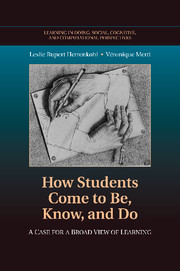Book contents
- Frontmatter
- Contents
- Series Foreword
- Acknowledgments
- How Students Come to Be, Know, and Do
- Introduction
- 1 The Context Lens
- 2 How Ways of Knowing, Doing, and Being Emerged in the Classroom: Interpersonal Interactions and the Creation of Community, Part I
- 3 How Ways of Knowing, Doing, and Being Emerged in the Classroom: Interpersonal Interactions and the Creation of Community, Part II
- 4 Personal Lens of Analysis: Individual Learning Trajectories
- Conclusion
- References
- Index
- Titles in the series
Conclusion
Published online by Cambridge University Press: 06 December 2010
- Frontmatter
- Contents
- Series Foreword
- Acknowledgments
- How Students Come to Be, Know, and Do
- Introduction
- 1 The Context Lens
- 2 How Ways of Knowing, Doing, and Being Emerged in the Classroom: Interpersonal Interactions and the Creation of Community, Part I
- 3 How Ways of Knowing, Doing, and Being Emerged in the Classroom: Interpersonal Interactions and the Creation of Community, Part II
- 4 Personal Lens of Analysis: Individual Learning Trajectories
- Conclusion
- References
- Index
- Titles in the series
Summary
…the conception of the school as a social center is born of our entire democratic movement. Everywhere we see signs of the growing recognition that the community owes to each one of its members the fullest opportunity for development. Everywhere we see the growing recognition that the community life is defective and distorted except as it does thus care for all its constituent parts. This is no longer viewed as a matter of charity, but as a matter of justice – nay, even of something higher and better than justice – a necessary phase of developing and growing life.
John Dewey (1902) The school as the social center (p. 86)In the course of the past four chapters we have introduced our broad view of learning and provided an empirical exploration of what it might look like to see school-based science learning from our perspective. Our purpose was to build a theoretical argument and methodological approach for studying science learning in a way that would account for the cognitive, social, and emotional dimensions of learning. The first chapter described the context of the study and the design-based approach we originally employed to initially examine students' scientific thinking alone. Empirical chapters demonstrate how our new broad view of learning and methodological approach was applied to the classroom where we had already documented significant science learning, as defined in narrower terms as ways of knowing and doing (Herrenkohl & Guerra, 1998).
- Type
- Chapter
- Information
- How Students Come to Be, Know, and DoA Case for a Broad View of Learning, pp. 191 - 200Publisher: Cambridge University PressPrint publication year: 2010

